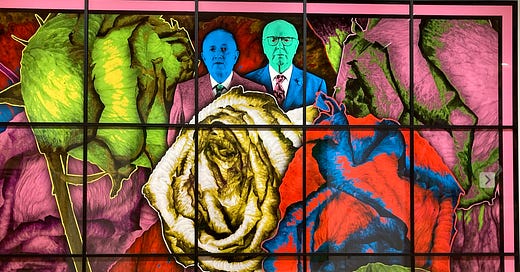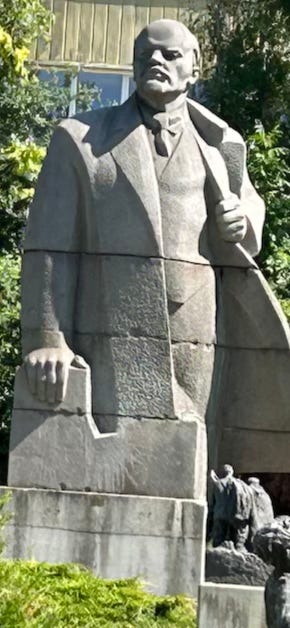Introduction
This essay explores how we navigate our desires in the current social landscape. The stimulation for this piece comes from my coaching experience. In the ‘coaching confessional’ individuals share their intimate personal feelings and thoughts in confidential safety. They often speak about desires, surprising themselves with their own thoughts and reflections.
In recent years I have trained coaches to ask ‘What is your desire?’ because it lands so powerfully with people. It resonates because our desires, what we want for ourselves, and what we think will make us happy, have become increasingly important to our current social imaginary. Collectively, our idea that we can find happiness through free choice and by working hard to optimise ourselves has become evermore powerful. To find this elusive happiness means to follow our true desires. What is striking is that although this fundamental question resonates very strongly, it seems we have done little work on thinking about what shapes our desires, where they come from, and how others influence our desires. This essay explores these questions.
Why Desire has Become Central?
Desire has moved from being one of many influences on us to becoming a very central influence. This follows a larger drift towards individualism, consumerism, and a growing focus on personal identity. Who we desire to be, what we desire to become, and how we desire that others see us, has become central to our very personhood, to the question of ‘who are you?’.
People strive to find the elusive state of happiness that society constantly encourages us to seek. To be our best selves, to follow our passion, to choose the right job or career or the perfect partner who will make us happy, we first have to understand what we really desire for ourselves. Unless we identify our true desire, we may spend a lifetime chasing false hopes and dreams.
This question of desire has become amplified and distorted by rampant individualism and the happiness fetish that has been rocket-boosted by relentless marketing. Our desires are the target and the essential element of consumer capitalism.
My last essay on the Wounded and Celebrated-Self, explains the rise of therapy culture and how the Wounded and Celebrated-Selves emerged as dominant social identities. To identify with the Wounded-Self is to realise that your desires are unfulfilled. To follow the logic of the Celebrated-Self, one is constantly trying to decipher and fulfil our desires.
Surface levels of understanding our desires lead us into an abyss. We have to deepen our exploration of the question ‘What is our true desire?’. Different ways of looking at the question take it beyond an individual quest. Desire is relational. Psychoanalysis teaches us that our desire is vital to what it means to be human in our modern times and that it is influenced by conscious, unconscious, and societal forces.
Exploring desire is vital, not only to help individuals transcend consumerist and narcissistic cultures but also to discover less destructive and more positive ways to live well with each other and with the environment.
Exploring Desire
To understand desire, I turn to psychoanalysis and Jacques Lacan. Engaging with the unconscious seems vital to get beyond the superficial ideas propagated by our consumer society that desires can be fulfilled by short-term pleasure hits. I take from psychoanalysis selectively, and make my own sense of it, as Lacan and other psychoanalytical approaches can be overly complicated to the point of distraction, and yet within them, nuggets of wisdom help us understand the human condition.
Desire is a conscious and unconscious process.
One of Freud’s great insights was that we are doubly subjected; to a) the conscious thoughts we are aware of, and b) to the unconscious attachments, investments, and drives that shape our thinking and behaviours, but that we are not fully aware of. Our desires are often caught between these two. Consciously, we know what we want, whilst our unconscious desires something else, and often sabotages the fulfilment of our conscious desires.
‘Desire is always the desire of the other’
“Desire full stop is always the desire of the Other. Which basically means that we are always asking the Other what he/she desires” (My Teaching, Lacan p.38).
This has two main parts; firstly our desires are not simply what we want, they are relational and entangled with other people. Secondly, our desires are closely linked with a need to be recognised by important Others (e.g. our parents). Lacan identifies how desire is not something that comes from deep within us but is thrust upon us from early encounters with the Other. From infancy, our desire is to fulfil the desire of the other (e.g. to please a parent figure, who signals to the infant what is pleasing and what is not). This means that to fulfil our desires is a constant process of wondering what the Other desires. Lacan’s insight is hugely valuable, we are social and relational beings, and our desires and thoughts are never taken in isolation, ‘no man (or woman) is an island’ (John Donne).
The Desire of the big Other
The Other from whom we desire recognition comes from two sources. Firstly, our main carers through our infancy and childhood; parents, grandparents, nannies, friends, and as we grow up other influential or inspirational individuals such as an important teacher. The second force that shapes our desires is known as the ‘big Other’.
The big Other is the social voice we internalise, which comes from society at large and from the groups we belong to, such as a church or a sports club. These influence, and often impose the values, morals, and social expectations we are expected to follow. Our desires are shaped by these forces, how our personal desires are shaped in the 2020s, will be different to how they are shaped in the 1950s.
We carry the voice of the big Other within us, and our desires are influenced consciously, by clear expectations set out in rules and laws, and also unconsciously through taken-for-granted norms, and cultural perceptions of what is right or good, and what success and happiness mean. These forces shape our aspirations and desires. To get to university, have a successful career, be a good husband, wife, or parent, become wealthy, own a nice house, or become a celebrity, our desires cannot escape what society inscribes upon us. Expectations relating to our age, gender, sexuality, career expectations, and social entitlements, are all shaped by the big Other.
Photo by Sophie Spree on Unsplash We desire recognition, and to gain this, we interpret what the other/big Other wants, in order to feel fulfilled. Even when we rebel against the other or big Other we cannot escape their influence.
For example, David was an activist who was fighting for gay rights, railing against the socially conservative family and church he was raised in. For much of his adult life, he was angry and fighting for gay rights. His partner left him, telling him he was so angry he couldn’t cope with the relationship any more. David went to therapy and when asked about his desire, he said he had always desired to be a ‘social warrior’, fighting for social justice. After a period of reflection, David realised he had been caught up in the desire of the other, to the extent he had not been able to think about his own desires. The big Other of the church, and the other of his family, all had tried to convince him to change his sexual orientation. Rather than enjoy his life and feel comfortable in his sexuality, he was entrapped by always responding angrily to the desire of the other. This insight allowed him to think about his own true desires, to travel, to walk the mountains, to find a stable partner and maybe to have a child. He remained active in gay rights but was no longer consumed by it.
Lack and prohibition create desire.
Two things often create desire: 1) “You can’t have it”…. “I want it!”. The thing we are prohibited becomes desirable; parents know this well! 2) Lack is a cause of desire. If we lack something, we experience an emptiness, something is missing, and we then desire what we lack. The challenge here is that we can feel emptiness, without knowing exactly what we are lacking.
Lacan said that we seek what he calls an ‘objet à’ which is an object that becomes a cover for our lack, something that stands in the place of what is lacking. We seek to fill our feeling of emptiness with some object or activity that takes away the empty feeling e.g. shopping or marathon running. When this happens, we fail to work on discovering our true desire, we just keep buying or being active to avoid feeling empty, which can lead to dysfunctional behaviours which undermine us. We buy a new car or dress or get plastic surgery, and we feel good for a fleeting moment, then that empty feeling returns, which haunts so many. That's how consumer capitalism works, in a ferocious cycle: lack creates desire, buy to fill the gap, lack returns after fleeting pleasure, which then creates new desire which activates us to buy the next product or service….. repeat.
Satisfaction kills desire.
As soon as our desires are satisfied, we no longer feel desire. If we managed to fulfil our desires through consumption, the car or the job we wanted, we would no longer buy stuff or work hard to chase more imaginary dreams. Lacan refers to the object cause of desire, saying that desire is not what we need to satisfy, it is the object cause of our desire we need to understand i.e. the hidden part of ourselves that is lacking. This cannot be discovered through rational thought, we can only find traces of it in our unconscious, how we seek pleasure or comfort through patterns of behaviour, for example.
Discovering One’s Desire: Case Example
A young man from a high-income family spent years rebelling against his father’s desire for him to become a lawyer and his private school’s desire that he should go to a top university. He became a punk, dropped out of school, got into trouble, and became lost and unhappy. He self-referred for counselling and he spoke proudly that he was rebelling against his father and society. Yet in counselling, he came to realise that his rebellion was still an entrapment as he was still tied into rebelling with anger against their desire, rather than discovering what he really desired for himself.
His acting out was seeking recognition that he was his own person, but paradoxically, he was entrapping himself in the role of an angry child, unable to free himself. This insight freed him from his ‘acting out’ behaviour and he began to search for his own path, which led him to take up horticultural studies and work in landscaping. He found his own pathway to fulfil his desires, and whilst he was always in relation to his father’s and the big Other’s desire, he was no longer determined by it. His father reconciled with him after realising his own desires could not, and should not be forced upon his son. Both were freed from their enmeshed relationship and discovered a new enjoyment together.
Personal Reflections
I am not a Lacanian devotee and happily veer from the path when my experience takes me elsewhere. I don’t agree with Lacan that our desire is always the desire of the other, or that we are always seeking recognition - other dynamics are also in play. However, recognising the influence of the other in shaping our desire is very helpful in de-centring ourselves from the false notion that we act as individuals free from social influences. This helps us understand ourselves and our desires better, and where they come from.
The personal is political
Exploring our true desires and seeking to understand the desire of the other/big Other, gives us not only increased personal agency and an opportunity to radically reshape our lives, it also has a socio-political perspective. Working to understand our true desires, and how they relate to others, is a consciousness-raising exercise that can undermine consumer capitalism’s desire to turn us into ‘buying machines’. It is not until we step out of our societal norms, that the shock of the mass branding and marketing ideology imposed on us becomes real.
Back in the 1990s, I travelled to communist East Germany and Poland. I recall the shock of returning to West Germany/Berlin at night. From zero advertising in the East to being bombarded with flashing advertising lights and billboards screaming at us to desire and buy! Since Naomi Klein wrote No-Logo in 1999, the infiltration of branding marketing has become endemic. Also, exposing specific desires, such as patriarchy that were once taken-for-granted norms, can liberate both men, women, and non-binary folk, from gender-essentialised behaviours and prohibitions.
In my work as a family therapist, I explored relationships within families and how wider social codes shaped individuals’ and families’ understanding of what their desires were for themselves, the family, and for different family members. It is revelatory for them to gain insights and to realise how they desire to gain recognition from parents, and parents from children.
Not determined by the other
We are not trapped in fixed relationships with the other, nor are we determined by the big Other’s desire. However, our subjectivity is shaped by the other’s desires and how we respond to these desires. Exploring how we want to please mothers/fathers, or to be like them (or not) can help reveal how our desires are shaped in the real world. We unconsciously transfer infant desires onto present-day relationships.
Sandy, who was always trying to gain positive recognition from parents, through performing being ‘nice’, became the employee who always tried to please her boss. When she received constructive ‘negative’ feedback from the boss, she was devastated. For Sandy, it wasn’t feedback, it felt like an attack on her whole identity which was being ‘good Sandra’. Her need to please was evident during her one-to-one coaching sessions, and we were able to work on her not-pleasing the coach to help her free herself from this entrapment and become aware of her own desires, separated from recognition from authority figures in her life.
In the case of the social big Other, we may also find ourselves in conflict. For example, if you are brought up in a fundamentalist religious environment you may find your desire to conform to group norms very difficult to shake off. If your personal experience clashes with the social codes of the group, you will struggle with a conscious desire to conform, and an unconscious desire to act in a way that accords to your true desires. This discrepancy can only be resolved by changing your relationship with how you respond to the desire of the big Other.
Buddhist Desire
There are many variations of Buddhist teaching in the West, telling us that desire is the root of our unhappiness, the cause of suffering and evil. Buddhists teach that to end our suffering is to lose our desire and our ego. This may be one solution to solving the human condition but let’s be honest, how many of us get anywhere close to this? And is it really possible or desirable to lose desire and ego? Whilst excess of both clearly leads to problems, and requires rebalancing, having desire is an important driver of creativity and progressive social (and personal) change. When we put our desires and egos to positive work for ourselves and for society, then the array of negative effects is reduced and good things can be achieved.
There is a strong critique of how Buddhism has been appropriated by the West, which claims that it has become distorted and is used instrumentally. Mindfulness, for example, has become a desired corporate training method, as it helps employees with their stress levels. Critical theorists claim that it also aims to create a compliant, uncritical, and hardworking workforce. This is not the intention of mindfulness, but how it has been selectively used. This approach undermines the desire for structural, political, and systemic changes. Perhaps the stress workers feel is because the company works them unrelenting hours, and the stress should not be personalised but read as a sign that organisational change is needed.
From a psychoanalytic perspective, desire and ego are part of human subjectivity. Perhaps an occasional Bodhissatva is found wandering the earth living a saintly life, but for the rest of us, the question of how to live well with our desires is the important quest. I am very aware that Buddhism comes in many forms, and that what I am discussing is the appropriation of Buddhism and how it is misunderstood and misused in society.
Conclusion
The question ‘What is our true desire?’, is of paramount importance today. Our distorted desires, have led to rising mental health issues, feelings of disenchantment and depression, and contribute to social justice issues and the environmental crisis through our consumerism.
Now is the time to question our relationship to our desires. The answers lie in recognising the underlying drivers of our desires, and discovering our true desires, which will include how we gain recognition from others….
Tips for the journey ahead
Staying with the trouble: Liberating ourselves from the immediate desire to get rid of the emptiness caused by lack. Taking time to explore what the lack really means for us.
Gaining recognition from the other/big Other in a conscious, aware way, not an unconscious, reactive response.
Emancipating ourselves from the desire of the capitalist big Other, to be compliant consumer subjects.
Co-creating a collective desire to live well on our planet alongside our multi-species companions, is surely the direction of travel!








Wonderful read. Thank you, Simon.